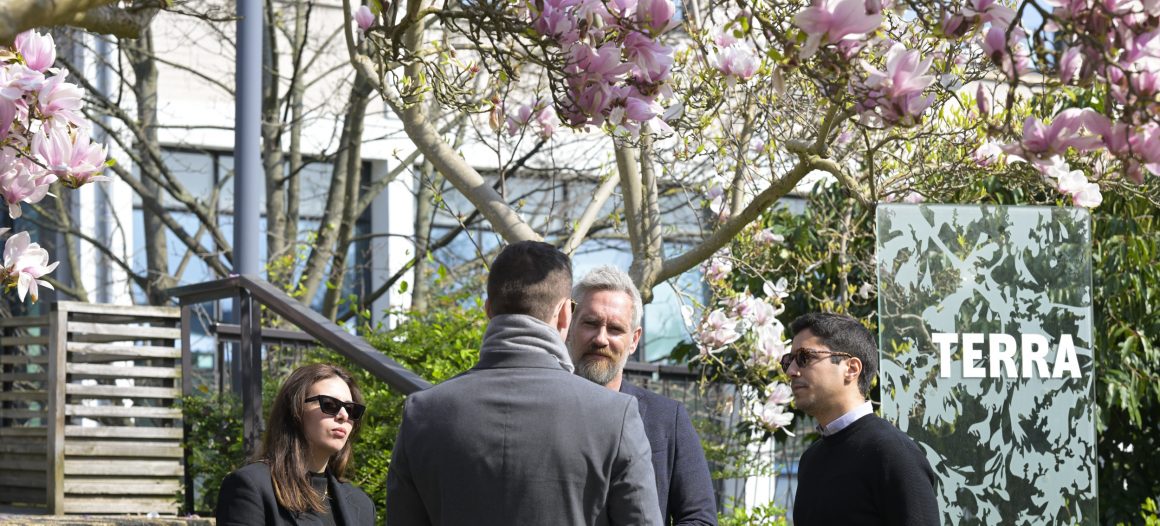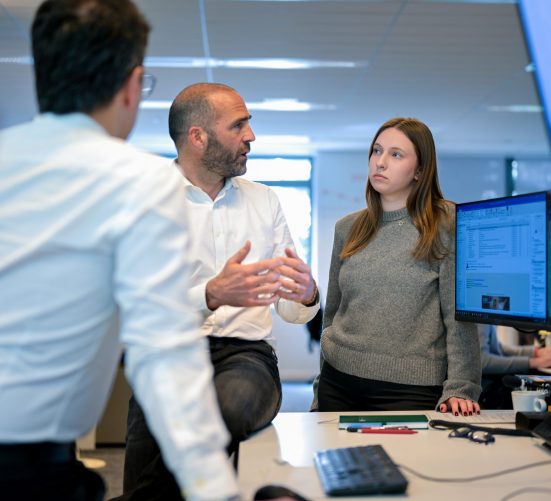Supporting the transition towards a sustainable economy

We are convinced that Crédit Agricole CIB has a role to play in contributing to a more sustainable world. We are ramping up our support for our clients in their decarbonation journeys and are developing innovative financing and investment solutions to support the ecological and environmental transition.
By setting targets for the sectors with the highest carbon emissions
As part of its membership of the Net Zero Banking Alliance (NZBA) aimed at contributing to carbon neutrality by 2050, the Crédit Agricole Group has set interim targets for 2025 and 2030 and established action plans in ten economic sectors to achieve those targets. Out of the ten sectors identified by the Group, eight directly concern Crédit Agricole CIB. These are the oil and gas, electricity, automotive, commercial real estate, cement, steel, aviation and marine transportation sectors.
In 2024, Crédit Agricole CIB continued to support its clients in the decarbonation of their portfolios and strengthened its range of solutions and partnerships to support the ecological transition. We won the prestigious annual IFR Bank for Sustainability award, “for creating a robust and transparent science-based net-zero decarbonation strategy that is delivering strong results and shaping sustainable finance”.
By making ambitious commitments in the fight against climate change
To contribute to the transition to a carbon-free and environmentally friendly economy, Crédit Agricole CIB has committed to:
- Reduce emissions in the Oil & Gas sector by 75% between 2020 and 2030 (vs. -30% announced in 2022),
- Reduce its exposure to oil extraction and production by 25% between 2020 and 2025,
- Participate only in arranging Green Bonds or Sustainability-Linked Bonds in the oil and gas sector,
- Increase our exposure to low-carbon energy by 80% between 2020 and 2025,
- Definitively exit the thermal coal industry (mines, power plants, dedicated transport infrastructure) by 2030 (in EU and OECD countries) and 2040 (in the rest of the world),
- Stop financing any new fossil fuel extraction project,
- Stop financing independent oil and gas producers and specialised independent energy producers.
By developing best practices for sustainability-linked loans
With its leading position in sustainable finance and its global expertise in the structuring of sustainability-linked loans, Crédit Agricole CIB was one of the coordinators of the International Capital Market Association (ICMA) joint taskforce which led to the publication of the ICMA Sustainability Bond Guidelines.
Building on this standardisation work carried out within ICMA, in 2024, Crédit Agricole CIB published the Sustainability-linked loan Financing Bond Framework, which promotes best practices and ensures transparency in the process of evaluating and selecting sustainability-linked loans. This framework was the first in the industry to include an “ESG Performance Criteria Index” grouping together all sector key performance indicators and the associated sustainability performance targets, used to select eligible loans.
This Sustainability-Linked Loans Framework illustrates Crédit Agricole CIB’s commitment to help clients on their decarbonation journey, while providing investors with tools to encourage sustainability.

Tanguy Claquin
Global Head of SustainabilityBy supporting our clients in their decarbonation journey
Our Bank is committed to helping its clients move towards more environmentally friendly business models. Our priority is to be their preferred partner in this process, by supporting their sustainability initiatives and providing financing solutions tailored to their CSR strategy.
Large corporates
As a partner of major international companies, our bankers and experts in green, social and sustainable financial products worked on several major transactions in 2024.
By way of illustration, among many transactions of this type, the issuance of a JPY 3 billion bond backed by a Sustainability-Linked Loans portfolio subscribed by Sumitomo Life Insurance Company was a market first.
We also supported many projects related to the transition. For example, we supported BlackRock and New Green Power in financing a large floating solar project in Taiwan, paving the way for new opportunities in the solar and renewable energy sector in Asia-Pacific.
Similarly, we closed the financing of the IPlanet charging network (a joint venture of the Italian petrol pump group IP and Macquarie Capital) for the deployment of an electric vehicle charging network in around 500 existing IP filling stations in Italy.
As exclusive debt financing advisor, we also supported two leading developers, BP and Energie Baden-Württemberg AG, in the offshore wind industry. The two offshore wind projects in the Irish Sea (UK), Morgan and Mona, will supply green electricity to the equivalent of around 3.4 million UK households.
Testimonial from EDF, a key player in the energy transition
For more than 10 years, Crédit Agricole CIB has been supporting the EDF group in its decarbonation strategy through the development of renewable energies. We supported EDF in the nuclear sector by setting up financing for the “Grand Carénage” programme, which aims to improve safety and continue the operation of nuclear power plants beyond 40 years. Xavier Girre, Group Senior Executive Vice President in charge of the Performance, Impact, Investment and Finance Directorate at EDF, explains the EDF group’s strategy for developing sustainable solutions.
Sovereign, supranational and agency issuers
The development of sustainability-linked bond issuance in the public sector demonstrates the key role of governments on climate, environmental and social issues. The sustainability-linked bond market has become an important source of financing for sovereign, supranational and agency issuers, which have the dual objective of supporting their country’s economy and financing decarbonation commitments.
Crédit Agricole CIB supported the European Union’s return to the capital markets with the issue of €8 billion in its first syndicated transaction of 2024.
We also worked with Agence France Trésor in the syndication of a French green sovereign bond, the largest in its history.
We also acted as global coordinator and joint green coordinator on State of Qatar’s inaugural green bond in May 2024.
SMEs and mid-caps
Housed within Crédit Agricole CIB, the Crédit Agricole Group’s mid-caps division supports small and medium-sized enterprises and intermediate-sized enterprises in defining their CSR strategy and implementing their decarbonation trajectory.
As a Green coordinator, Crédit Agricole CIB, for example, supported the implementation of the inaugural green syndicated financing of Waga Energy, the leader in biomethane production at waste storage sites. This credit facility, labelled as a “green loan” according to the European taxonomy, should enable Waga Energy to finance projects that contribute substantially to the mitigation of climate change.

By committing to preserving biodiversity
Since 2022, Crédit Agricole CIB has calculated two biodiversity-related indices to better assess physical risks and transition risks. The Bank has also participated in several projects aimed at mapping biodiversity-related data, methodologies and information providers. In 2023, Crédit Agricole CIB contributed alongside the Crédit Agricole Group to the working group under the aegis of the Principles for Responsible Banking aimed at establishing recommendations for objectives or best practices concerning nature. In 2024, Crédit Agricole CIB continued to assess its clients’ dependence on biodiversity, as well as the impact of their activities on natural environments. The Bank offers solutions to serve the carbon and biodiversity strategy of its large corporate and investor clients as well as financing solutions for projects with a positive impact.
By committing to respect for human rights
Crédit Agricole CIB ensures respect for and promotion of fundamental human rights, which are the foundation of corporate social responsibility. Its Statement on Tackling Modern Slavery and Human Trafficking attests to this commitment. It has procedures and tools to ensure human rights are respected in its financing operations, the management of its human resources and its supply chain. Crédit Agricole CIB is also strongly committed to diversity and inclusion. We have incorporated into our internal processes the principles upheld by the international charters and agreements to which we are signatory.
By supporting employees in societal transformations
Aware of environmental and societal issues, Crédit Agricole CIB is developing a training ecosystem aimed at training employees in corporate social responsibility to ensure they fully understand sustainability issues and instil a collective movement.
Crédit Agricole CIB has accelerated the development of its ESG Academy, which currently has two levels: an “acculturation” level for all employees and an “advanced” level to support the upskilling of employees most exposed to ESG issues. In 2024, we continued to roll out Climate Fresk workshops in more than 15 countries, offering more than 4,000 employees the opportunity to better understand the challenges of climate change. This large-scale roll-out draws on a network of 80 internal facilitators who organise workshops for their colleagues and provide training on the Bank’s climate strategy.
20 years of commitment to sustainable finance
From the creation of the Equator Principles in 2003 to the implementation of sector-specific commitments, as well as the creation of teams dedicated to international sustainable finance and the execution of emblematic transactions, our Bank has been committed to meeting the climate challenge for more than 20 years.
Look back at the key moments of this journey with a video that illustrates our long-term commitment to supporting our clients in the energy transition and decarbonation of their portfolios.

